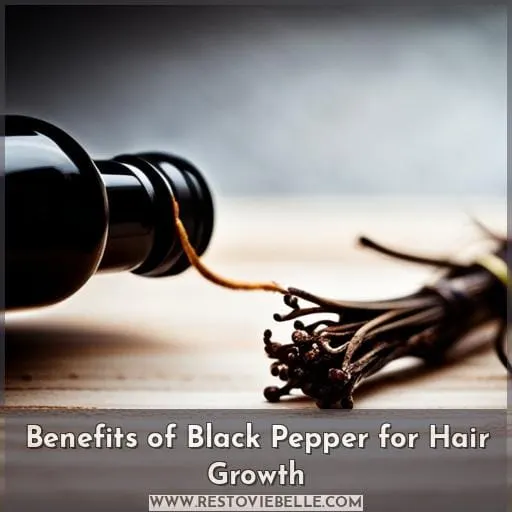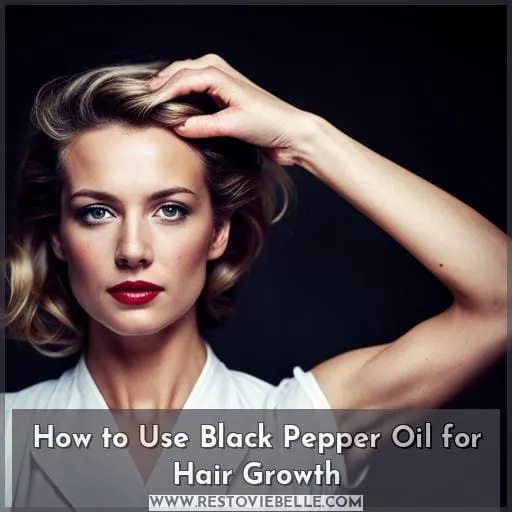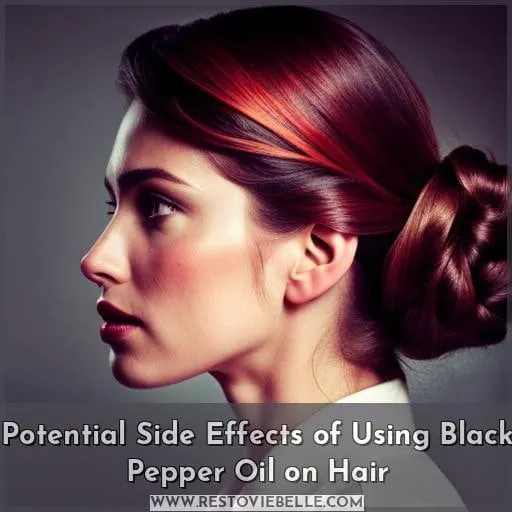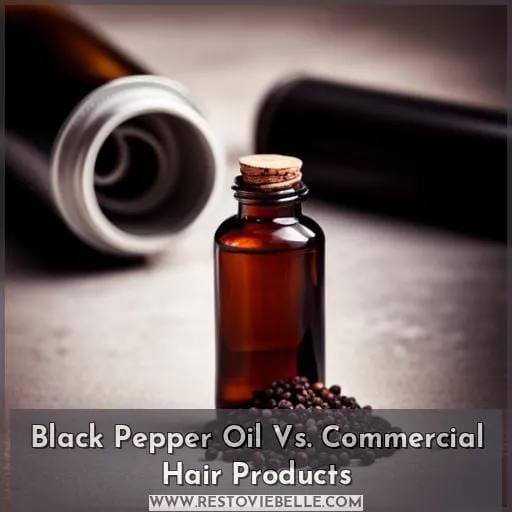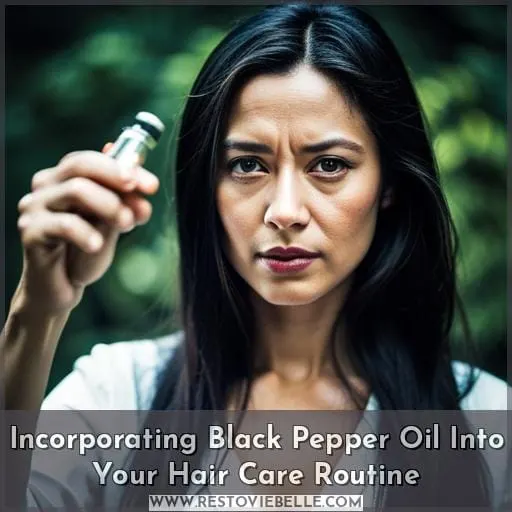This site is supported by our readers. We may earn a commission, at no cost to you, if you purchase through links.
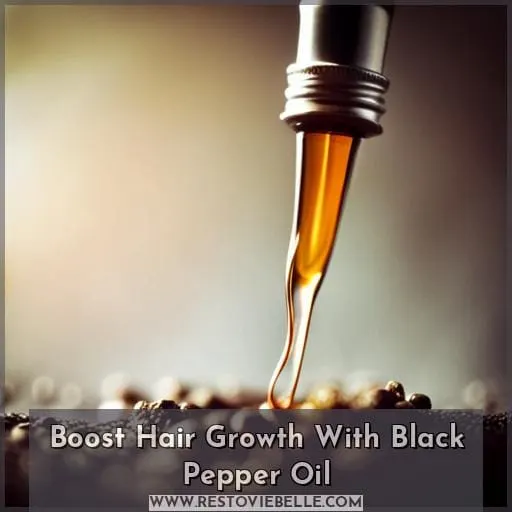 Looking to boost hair growth? Look no further than black pepper oil.
Looking to boost hair growth? Look no further than black pepper oil.
This versatile spice, packed with vitamins and antioxidants, has been used for centuries in Ayurveda for its healing properties.
Scientifically rigorous studies have shown that black pepper stimulates hair follicles, controls hair fall, prevents premature graying, and reduces dandruff.
Incorporating black pepper oil into your hair care routine can provide the nourishment needed for healthy and vibrant locks.
Say goodbye to dull strands and hello to luscious growth with the power of black pepper oil.
Table Of Contents
- Key Takeaways
- Benefits of Black Pepper for Hair Growth
- How to Use Black Pepper Oil for Hair Growth
- Potential Side Effects of Using Black Pepper Oil on Hair
- Black Pepper Oil Vs. Commercial Hair Products
- Incorporating Black Pepper Oil Into Your Hair Care Routine
- Frequently Asked Questions (FAQs)
- Can black pepper oil be used on all hair types?
- Is it necessary to dilute black pepper oil before applying it to the scalp?
- How often should black pepper oil be used for hair growth?
- Can black pepper oil be used as a standalone treatment for hair loss?
- Are there any precautions to take when using black pepper oil on the scalp?
- Conclusion
Key Takeaways
- Black pepper oil stimulates hair follicles and promotes hair growth.
- It helps control hair fall and reduces dandruff.
- Black pepper oil prevents premature graying of hair.
- It is a safe and natural alternative for pregnant women to promote hair growth.
Benefits of Black Pepper for Hair Growth
Black pepper has several benefits for hair growth.
It stimulates the hair follicles, promoting increased blood circulation and nutrient delivery to the scalp.
Additionally, black pepper’s antibacterial properties can reduce dandruff, keeping the scalp healthy and supporting overall hair health.
Stimulates Hair Follicles
To stimulate hair follicles, apply black pepper oil to your scalp and massage it in.
Black pepper contains piperine, which can promote blood circulation to the hair follicles. This increased blood flow delivers essential nutrients that contribute to healthy hair growth.
Additionally, black pepper’s antibacterial properties help prevent scalp infections that can lead to hair loss.
By incorporating black pepper oil into your routine, you can improve the health of your scalp and promote stronger and thicker hair growth.
Controls Hair Fall
You can effectively control hair fall by incorporating black pepper oil into your hair care routine.
Black pepper stimulates blood circulation, which promotes nutrient delivery to the hair follicles and prevents hair loss.
It also has antibacterial properties that keep the scalp healthy and reduce dandruff, further preventing hair fall.
Additionally, black pepper helps prevent premature graying of the hair.
With its safe and natural benefits for promoting healthy hair growth, black pepper oil is a powerful tool in combating excessive shedding and maintaining strong locks.
Prevents Premature Graying
Prevent premature graying of your hair by incorporating black pepper oil into your hair care routine.
Black pepper contains antioxidants that help protect the hair follicles from damage and strengthen them, reducing the risk of premature graying.
Additionally, black pepper stimulates blood circulation to the scalp, delivering essential nutrients that promote healthy hair growth and prevent hair loss.
Its antibacterial properties also reduce dandruff formation, ensuring a healthier scalp environment for stronger and thicker hair strands.
Reduces Dandruff
Say goodbye to dandruff with the help of black pepper oil.
Black pepper, rich in piperine, naturally removes dandruff by keeping the scalp healthy and free from infection. It also stimulates blood circulation, promoting hair growth and preventing hair loss.
Safe for pregnant women, incorporating black pepper into your hair care routine can effectively reduce dandruff while benefiting overall scalp health.
How to Use Black Pepper Oil for Hair Growth
To promote hair growth, there are several ways you can use black pepper oil.
One method is to create a DIY black pepper hair mask by mixing the oil with yogurt.
Another option is to massage your scalp with black pepper oil, which helps activate blood circulation and nourish the hair follicles.
Additionally, you can infuse regular herbal hair oils with black pepper for added benefits in promoting healthy hair growth.
DIY Black Pepper Hair Mask
To harness the benefits of black pepper oil for hair growth, try making a DIY black pepper hair mask.
Mix 1 teaspoon of black pepper with 1 tablespoon of coconut oil and castor oil.
Apply the mixture to your scalp and massage for a couple of minutes.
Leave it on for 10-15 minutes before washing your hair with shampoo.
Use this mask once or twice a week to see results in improved hair growth and reduced hair fall.
Remember to do a patch test before using, as some individuals may experience allergic reactions.
Black Pepper Oil Massage
Massage your scalp with black pepper oil to promote hair growth and improve the health of your hair.
Black pepper oil contains piperine, which inhibits the enzyme 5-alpha-reductase that converts testosterone to DHT, a hormone linked to hair loss.
To use black pepper oil for hair growth, mix it with carrier oils like coconut or castor oil and massage onto the scalp for a few minutes.
Use caution when using essential oils undiluted and discontinue if any irritation occurs.
Black Pepper Oil Infused Hair Oil
Are you wondering how to incorporate black pepper oil into your hair care routine for optimal hair growth?
One way to utilize the benefits of black pepper oil is by making an infused hair oil.
To make this, mix 1 teaspoon of black pepper with a carrier oil like coconut or olive oil.
Let it sit for two weeks before straining and applying it to your scalp.
Leave it on for about half an hour before rinsing off with cold water.
This can help stimulate blood circulation, nourish the hair follicles, and promote healthy hair growth when used regularly.
Potential Side Effects of Using Black Pepper Oil on Hair
Using black pepper oil on your hair may have potential side effects that you should be aware of.
One common side effect is scalp irritation, which can occur when the oil comes into direct contact with your skin.
Additionally, consuming black pepper orally may lead to gastrointestinal reactions such as ulcers and gastritis if taken on an empty stomach.
Lastly, it’s important to note that some individuals may experience allergic reactions when applying black pepper oil directly to their scalp.
Scalp Irritation
If you experience scalp irritation, black pepper oil may not be suitable for your hair care routine.
Scalp irritation can occur due to the strong and spicy nature of black pepper oil. It’s important to note that individual reactions may vary, and some people may be more sensitive to its effects than others.
To reduce scalp irritation, it’s recommended to dilute black pepper oil with a carrier oil before applying it on the scalp or consider alternative hair growth remedies such as turmeric-infused oils.
Gastrointestinal Reactions
If you experience gastrointestinal reactions, such as ulcers or gastritis, after using black pepper oil on your hair, it’s important to discontinue use and seek medical advice.
Gastrointestinal reactions may manifest as:
- Stomach pain
- Heartburn
- Nausea
- Vomiting
- Diarrhea
These side effects could be attributed to the strong spicy nature of black pepper oil and its potential irritant properties on the digestive system.
It’s crucial to prioritize your health and consult with a healthcare professional if you encounter any adverse reactions.
Allergic Reactions
If you have sensitive skin or a known allergy to black pepper, it’s important to be cautious when using black pepper oil on your hair.
Allergic reactions can occur when the immune system reacts negatively to an allergen, such as black pepper.
Symptoms of allergic reactions may include itching, redness, swelling, and hives on the scalp or surrounding areas.
Treatment for allergic reactions typically involves avoiding further exposure and using antihistamines or corticosteroids to alleviate symptoms.
Preventive measures include patch testing before applying black pepper oil and carefully reading product labels for potential allergens.
The severity of allergic reactions can vary from mild discomfort to more severe complications like difficulty breathing or anaphylaxis in rare cases.
Black Pepper Oil Vs. Commercial Hair Products
When comparing black pepper oil to commercial hair products, there are several key points to consider.
Firstly, black pepper oil is derived from natural ingredients and doesn’t contain harsh chemicals that can potentially damage the hair or scalp.
Additionally, using black pepper oil for hair growth is a cost-effective alternative as compared to expensive commercial products.
Lastly, black pepper oil offers a safer option with minimal side effects when used in moderation compared to some commercially available options that may have adverse effects on both the scalp and overall health.
[REFERENCES]:
- Prasad S., Tyagi A.K., Aggarwal B.B.(2014). Recent Developments in Delivery,Therapeutic Applications,and Properties of Curcumin (Curcuma longa L.
- Goel R,Kunnumakkara AB,Aggarwal BB.Curcumin asCure-cuma:from kitchen spice ot key ingredient in modern medicine.
Natural Ingredients
To compare the benefits of black pepper oil with commercial hair products, consider their natural ingredients.
Black pepper oil contains antioxidants and piperine, which can protect the scalp and promote healthy hair growth by improving blood circulation and inhibiting enzymes linked to hair loss.
Commercial hair products often contain synthetic chemicals that may cause damage to the scalp and strip away natural oils.
Opting for black pepper oil as a natural alternative can provide numerous benefits for your hair’s health and vitality.
Cost-Effectiveness
When comparing the cost-effectiveness of black pepper oil and commercial hair products, you’ll find that black pepper oil offers a more affordable alternative without compromising on its beneficial properties.
Not only is it easier to use, but it also provides less irritating effects compared to some harsh chemicals found in commercial hair products.
Additionally, black pepper oil has been shown to be more effective in promoting longer-lasting and healthier hair growth when used regularly.
Safer Alternative
When it comes to finding a safer alternative for your hair care routine, black pepper oil stands out as an excellent choice compared to commercial hair products.
- Non-toxic and natural: Black pepper oil is derived from natural sources and doesn’t contain harmful chemicals found in many commercial hair products.
- No side effects: Unlike some commercial products that can cause scalp irritation or allergic reactions, black pepper oil is generally well-tolerated with no reported side effects.
- Affordable option: Commercial hair products can be expensive, but black pepper oil offers an affordable alternative without compromising effectiveness.
- Effective results: Studies have shown that the active compounds in black pepper promote blood circulation to the scalp and stimulate follicle activity, leading to improved hair growth.
Incorporating black pepper oil into your daily routine provides a safe, non-toxic solution for promoting healthy hair growth without any unwanted side effects typically associated with commercial options.
Incorporating Black Pepper Oil Into Your Hair Care Routine
To incorporate black pepper oil into your hair care routine, you can:
- Mix it with other oils such as coconut or castor oil to enhance its benefits for hair growth.
- Apply the mixture directly to your scalp and massage gently for a few minutes before rinsing out.
It’s recommended to use black pepper oil on a regular basis, but avoid excessive use due to its strong spicy nature.
Mixing With Other Oils
Now, let’s delve into how you can incorporate black pepper oil into your hair care routine by mixing it with other oils.
When it comes to choosing a carrier oil best for hair growth, coconut oil and castor oil are excellent options. These oils have been used in Ayurvedic hair care for their nourishing and strengthening properties.
By combining black pepper essential oil with coconut or castor oil, you can create a potent blend that promotes healthy hair growth and addresses issues such as dandruff or scalp infections.
Application Methods
To incorporate black pepper oil into your hair care routine, you can try various application methods.
- Scalp Massage:
- Dilute a few drops of black pepper oil with a carrier oil and massage it onto your scalp for 5-10 minutes.
- This helps to stimulate blood circulation and deliver nutrients to the hair follicles.
- Hair Mask:
- Mix black pepper oil with other ingredients like yogurt or lemon juice to create a nourishing hair mask.
- Leave it on for 15-30 minutes before rinsing off.
- Infused Hair Oil:
- Combine black pepper oil with a herbal hair oil and let it sit for two weeks before using as regular hair treatment.
Frequency of Use
To incorporate black pepper oil into your hair care routine, you should consider the frequency of use.
Some people may choose to use black pepper oil once a week as a deep treatment, while others may opt for twice-weekly applications for more intensive nourishment. Daily or excessive use isn’t recommended as it can lead to scalp irritation and other potential side effects.
| Frequency | Usage |
|---|---|
| Once a week | Deep treatment for nourishing the scalp and promoting growth |
| Twice a week | Intensive therapy targeting specific hair concerns |
| Monthly | Maintenance routine to support healthy hair growth |
Table: Suggested frequencies of incorporating black pepper oil into your hair care routine
Frequently Asked Questions (FAQs)
Can black pepper oil be used on all hair types?
Yes, black pepper oil can be used on all hair types.
It stimulates blood circulation to the scalp, promotes healthy hair growth, controls hair fall and dandruff.
Use it with caution due to its strong nature.
Is it necessary to dilute black pepper oil before applying it to the scalp?
Yes, it’s necessary to dilute black pepper oil before applying it to the scalp.
Undiluted black pepper oil can cause skin irritation and burning sensation.
Dilution with carrier oils like coconut or olive oil is recommended for safe use on the scalp.
How often should black pepper oil be used for hair growth?
For optimal hair growth, use black pepper oil on your scalp twice a week.
Its active compound, piperine, stimulates blood circulation and inhibits the enzyme 5-alpha-reductase linked to hair loss.
Remember to dilute it before applying!
Can black pepper oil be used as a standalone treatment for hair loss?
Black pepper oil can be a powerful tool in combating hair loss.
Its antioxidant properties and ability to inhibit the enzyme 5-alpha-reductase make it an effective treatment option.
Use it as part of a comprehensive regimen for optimal results.
Are there any precautions to take when using black pepper oil on the scalp?
To ensure safety when using black pepper oil on your scalp, it’s important to take precautions.
- Avoid applying the oil directly if you have a known allergy or sensitive skin.
- Conduct a patch test before full application.
- Consult with a healthcare professional if unsure.
Conclusion
To boost hair growth, look no further than black pepper oil. This versatile spice has been used for centuries in Ayurveda for its healing properties.
Scientific studies have shown that black pepper stimulates hair follicles, controls hair fall, prevents premature graying, and reduces dandruff.
Incorporating black pepper oil into your hair care routine can provide the nourishment needed for healthy and vibrant locks. Say goodbye to dull strands and hello to luscious growth with the power of black pepper oil.

